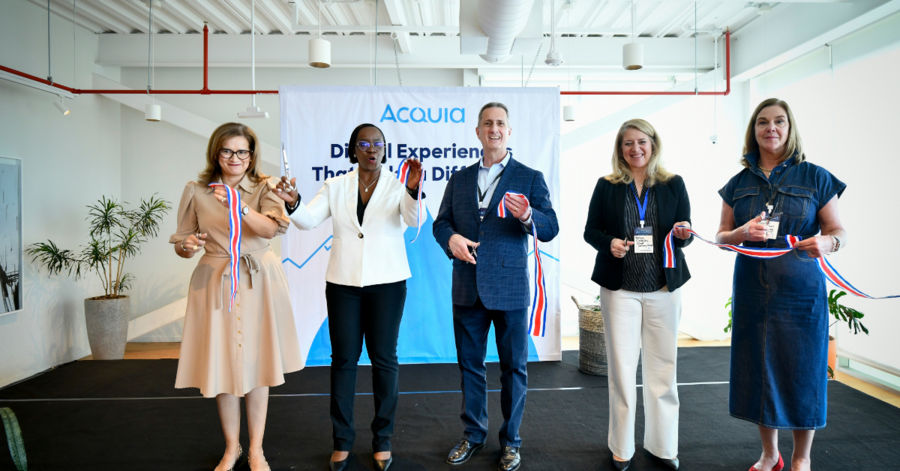February 25, 2022. San Jose, Costa Rica – This Friday,
Microsoft opened the doors to its modern offices in La Sabana’s Torre Universal building, located downtown in the capital San Jose. The opening also served to celebrate the company’s 28 years in Costa Rica; 4 years ago, the company had just 60 local employees and today, it employs 1,500.
Daniel Verswyvel, the General Manager of Microsoft Central America, commented, “Our operational expansion in Costa Rica is a result of our continuing efforts to transform and innovate with Costa Ricans, to such an extent that we continue increasing our presence in the country, so that we can continue strengthening our technological ecosystem and empowering all people and organizations to achieve more.”
He added: “Our facilities at Torre Universal provide the ideal environment to shape the future of
technology and to work with our clients and business partners toward digital transformation in Costa Rica and the Americas. Our new headquarters were designed to create the best experience for our growing number of employees – to offer them a flexible and inclusive work environment, foster well-being, and encourage collaboration and creativity, while still maintaining our hallmark of sustainability and Costa Rican culture.”
Carlos Alvarado, the President of the Republic, thanked the company for its deep trust in Costa Rica and our human talent. “Accelerated growth from one of the most important companies in the world is a clear sign that Costa Rica has the resources, education, and highly qualified human talent to be a benchmark for digital transformation on a global stage, working hand in hand with companies like Microsoft.”
In addition to the president, the opening event was attended by Rodrigo Kede, President of Microsoft Latin America; Daniel Verswyvel, General Manager of Microsoft Central America; Ineke Geesink, Country Manager for Microsoft Costa Rica; Andrés Valenciano, the Minister of Foreign Trade (COMEX, for its acronym in Spanish); Paola Vega, the Minister of Science, Innovation, Technology, and Telecommunications (MICITT, for its acronym in Spanish); and Karin Lachner, the Director of Communications and Marketing for the Costa Rican Investment Promotion Agency (CINDE, for its acronym in Spanish), among other high-ranking representatives from Microsoft and the Costa Rican government. Likewise, 1,500 company employees and members of the press participated through hybrid systems.
Andrés Valenciano, the Minister of Foreign Trade, was at the opening and commented, "The trajectory that Microsoft has taken in our country over the last 28 years is a clear example of the commitment we have to working hand in hand with highly prestigious companies and creating greater well-being for the Costa Rican population. Thanks to our unique and comprehensive positioning, the company has established in Costa Rica its largest Latin American headquarters, which demonstrates how Costa Rica contributes to the knowledge economy through decarbonization, connectivity, and
innovation.” In addition, he mentioned: "We are confident that Microsoft will continue to meet important milestones with help from our human talent and, thus, continue hosting new business units that will continue contributing to its operations in the Americas."
CINDE's Communication and Marketing Manager, Karin Lachner, commented: “The global health crisis has been a catalyst for driving digital transformation processes around the world. The most recent figures from UNCTAD show that Information and Communication Technologies (ICT) is the fastest growing sector, both in value and the number of projects in 2021, growing 22% and 15%, respectively. Costa Rica has proven to be the ally for companies that lead this global change; Microsoft is one of them. We celebrate their incorporating high-complexity functions, such as engineering and design. We trust that Costa Rican talent will be a key piece of this new era of Microsoft solutions.”
During the meeting, Microsoft representatives reaffirmed their commitment to the country and shared with the government delegation the development and transformation opportunities they envision for Costa Rica and the region.
"Because of the enormous talent, potential, and growth that we have witnessed since our arrival in the country, we have chosen Costa Rica for Microsoft’s largest operations in Latin America. Here, we have established a dynamic platform to develop qualified and high-value talent and we’re betting on Costa Ricans, by placing our Latin American regional centers here, for both Technical Customer Service and Internal Sales," noted Ineke Geesink, Microsoft Country Manager in Costa Rica.
Dynamic, Diverse, and Growing Human Talent. Microsoft's expansion in Costa Rica has been dramatic. It expanded from fewer than 60 employees just 4 years ago to today’s 1,500, and has created an average of 400 highly qualified new positions every year.
Likewise, it went from one operations and sales business unit to three, adding Digital Sales and the Support area, which provide their services throughout the Americans. Additionally, a growing engineering team, which in a few months will have 150 members, is headquartered in San José and charged with creating and designing Microsoft’s main products and solutions.
The company knows that diversity is a trigger for creativity and innovation. Comprised of 90% Costa Rican talent, the Microsoft Costa Rica team is enriched by empowered women, ethnic minorities, regional talent, and differently abled people, thus fulfilling the company's mission to reflect the society it serves and integrate all perspectives into the technologies they create.
The internal teams of Blacks@Microsoft, Women@Microsoft, Disability@Microsoft, and Gleam@Microsoft (LGTBQI+ Community) have received local and even global recognition for their efforts in favor of inclusion, diversity, and equal opportunities.
Harry Vargas, Director of Human Resources for Microsoft Costa Rica, added: "We are committed to attracting and developing a workforce that is not only highly qualified but also diverse, thus allowing us to strengthen an inclusive technological ecosystem where we will continue working to present technology solutions and tools that support organizations in their digital transformation, with help from our more than 1,000 business partners and that reflect the riches and needs of the society they serve."
Smart Offices. Microsoft’s five floors at Torre Universal have the capacity for 1,700 employees and leverage the most advanced technologies for hybrid work, as well as facilities designed for the wellbeing of its employees, clients, and guests.
The office has smart and modular auditoriums to hold up to 260 attendees, as well as common cafeteria spaces, terraces, rest spaces, video game rooms, maternity rooms, showers, and coffee and snack stations on each floor.
These headquarters were designed in 3D from the outset, starting with the structural, mechanical, and electrical parts; there is a "digital twin" that enables managing and operating the facilities both virtually and automatically, to perform simulations and to interconnect all information in an intelligent and unified manner. From the visitor information kiosks to the pre-registration or reservation of rooms and workspaces, transportation service, or a parking lot, everything has been digitized to optimize management and the employee experience.
Impacting Costa Rican Development and Transformation. Microsoft has worked closely with the Costa Rican government to build various agreements and programs that put technologies, solutions, and knowledge at the service of Costa Ricans, to achieve an inclusive economic recovery.
For example, last November, Microsoft and the Costa Rican Ministry of Science, Innovation, Technology, and Telecommunications (MICITT) signed an agreement to achieve effective
cybersecurity and information security practices in the public sector.
Microsoft offered Costa Rica its experience and knowledge, to cooperate in strengthening cybersecurity capabilities within the country’s public entities, through joint education, skill-building, and training activities, without any obligation or cost to the government. Additionally, during the pandemic, Microsoft cooperated with the Ministry of Education (MEP, for its acronym in Spanish) and ICE (the Costa Rican Electric Institute, for its acronym in Spanish) in training 70,000 teachers in Office 365 and Microsoft Teams to support virtual teaching. The company worked closely with the National Institute for Learning (INA, for its acronym in Spanish) in the launch of the "Technological Seedbed" pilot, which benefited 500 students in building talent in key areas, such as architecture and Azure
cloud solutions; the second round of training is slated to begin soon.
As part of its mission to empower everyone, in September 2021, Microsoft established an alliance with the National Institute for Women (INAMU, for its acronym in Spanish), to train women entrepreneurs in access to and the use of technology, and to support them in bettering their businesses and ventures, so that the economic recovery would leave no one behind.
Geesink concluded, “In the 28 years that we have been in Costa Rica, we have contributed to strengthening the country's technological systems, in partnership with more than 1,000 business partners who earn 5.8 dollars for every dollar generated through Microsoft cloud services. We have promoted SMEs and startups, and have invested in technology and training for education; with this, we have impacted 2 million students and 70,000 teachers. We've also invested $11.5 million in cash and software donations to local nonprofits. We will continue to collaborate with the government of Costa Rica, and we will continue to invest in the operations that we have built in this wonderful country, because we deeply believe in Costa Rican talent and its potential.”
About MicrosoftMicrosoft (Nasdaq “MSFT” @microsoft) enables digital transformation in the cloud era and smart ecosystem. Its mission is to empower every person and organization on the planet to do more.







